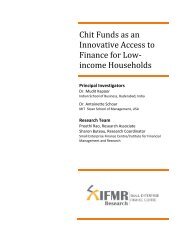Government of India Volume I: Analysis and Recommendations
Government of India Volume I: Analysis and Recommendations
Government of India Volume I: Analysis and Recommendations
Create successful ePaper yourself
Turn your PDF publications into a flip-book with our unique Google optimized e-Paper software.
SYSTEMIC RISK<br />
filings by financial firms. It must be noted however that regulators <strong>and</strong> agencies will continue<br />
to collect any data that they require until the FDMC is fully functional. The FDMC will<br />
also contain public domain data from the economy at large, as appropriate.<br />
Once the FDMC is operationalised each regulated entity will only submit all regulatory<br />
data through the database. Further, each regulatory agency will only be allowed to access<br />
the data it is authorised to collect from the entities that it regulates, to ensure that there is<br />
no widespread access by all regulatory agencies to a regulated entity’s data. This access<br />
will be governed by memor<strong>and</strong>a <strong>of</strong> underst<strong>and</strong>ing that the members will enter into with<br />
the FSDC <strong>and</strong> the FDMC.<br />
Table <strong>of</strong> <strong>Recommendations</strong> 9.5 The Financial Data Management Centre<br />
◮ The FDMC will work within the FSDC as the sole electronic system for the collection <strong>of</strong> data from financial<br />
entities for regulatory reporting <strong>and</strong> supervision;<br />
◮ All decisions on the nature <strong>of</strong> information to be collected will be entirely within the domain <strong>of</strong> individual<br />
regulatory agencies;<br />
◮ The FDMC staff will merely aggregate the data <strong>and</strong> provide access to the regulators. All vetting <strong>and</strong> review <strong>of</strong><br />
such data, <strong>and</strong> requests for additional information will continue to be done by the individual regulators; <strong>and</strong><br />
◮ The FSDC would be empowered to enter into memor<strong>and</strong>a <strong>of</strong> underst<strong>and</strong>ing with other regulators such as the<br />
CCI or other statutory agencies associated with the financial system for increasing the ambit <strong>of</strong> a centralised<br />
data collection, transmission <strong>and</strong> warehousing function.<br />
To preserve data confidentiality, the FSDC’s use <strong>of</strong> the data in the FDMC will be governed<br />
by the draft Code. It is envisaged that where the FSDC is required to obtain information<br />
from unregulated financial entities, it will be able to do so; however requests for<br />
data by the FSDC must necessarily be in consonance with it’s objectives. There will be<br />
legal procedures, grounded in principles <strong>of</strong> due process <strong>and</strong> regulatory governance that<br />
will guide the request for such data by the FSDC.<br />
It is envisaged that anonymised data from the FDMC (which will not contravene confidentiality<br />
or privacy concerns or other law) may be made available for access to research<br />
bodies <strong>and</strong> members <strong>of</strong> the public to foster greater analysis <strong>and</strong> research relating to the<br />
financial system.<br />
The FDMC would represent the first accretion <strong>of</strong> information on a financial system<br />
scale in <strong>India</strong>. With this data in h<strong>and</strong>, the FSDC would conduct a research programme<br />
on the problems <strong>of</strong> monitoring <strong>and</strong> mitigating systemic risk, through the identification<br />
<strong>of</strong> system-wide trends. In addition, the FDMC would also reduce the burden <strong>of</strong> multiple<br />
filings by financial firms, <strong>and</strong> promote a more efficient system <strong>of</strong> regulatory information<br />
gathering. Many benefits accrue from creating an FDMC, including de-duplication <strong>of</strong><br />
regulatory filings, lower costs <strong>of</strong> compliance for firms, <strong>and</strong> st<strong>and</strong>ardisation <strong>of</strong> regulatory<br />
data st<strong>and</strong>ards. Members <strong>of</strong> the public <strong>and</strong> research bodies will also be able to access<br />
anonymised data to foster greater analysis <strong>and</strong> research <strong>of</strong> the financial system.<br />
The operations <strong>of</strong> the FDMC are defined in Table 9.5.<br />
It is evident that there will be considerable challenges that the FSDC would face while<br />
trying to conduct this research programme. The patterns <strong>of</strong> systemic risk in <strong>India</strong> are likely<br />
to differ considerably when compared with the experiences <strong>of</strong> more developed countries,<br />
which limits the portability <strong>of</strong> knowledge <strong>and</strong> ideas from those settings. Additionally, policy<br />
<strong>and</strong> scholarly underst<strong>and</strong>ing <strong>of</strong> systemic risk is relatively underdeveloped to the extent<br />
that actions to develop these databases have begun as recently as 2010 in countries<br />
such as the US. The FSDC would have to undertake special efforts in ensuring that the research<br />
programme has adequate capabilities <strong>and</strong> meets the desired end. The research<br />
programme must:<br />
1. Identify the interconnectedness <strong>of</strong>, <strong>and</strong> systemic risk concerns in, the financial system;<br />
94 FINANCIAL SECTOR LEGISLATIVE REFORMS COMMISSION



